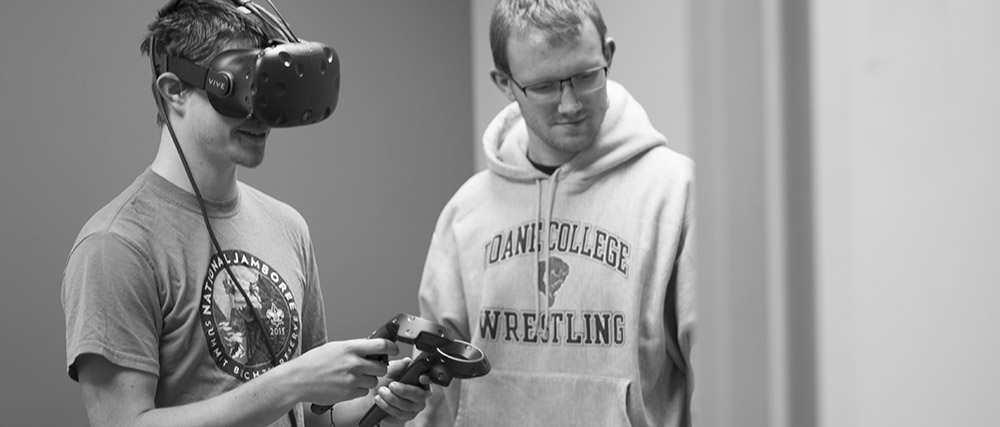
Cyber Security and Information Technology Undergraduate Program
Preparing graduates for today’s careers and tomorrow’s opportunities.
College of Arts and Sciences
Location: Crete, Lincoln
Degree Type: Undergraduate
Doane’s Computing program provides students looking for a cybersecurity degree with the competency to prepare them to enter the industry in software development or information technology and cybersecurity-related areas. What distinguishes Doane graduates from their peers graduating from other schools are the essential non-technical competencies cultivated through the active-learning emphasis and liberal-arts focus of Doane. These competencies, along with technical competencies, are developed through immersive experiences both inside and outside the classroom. These make graduates of the Doane Computing program highly sought after by employers and graduate schools.
The competencies, developed with guidance from our alumni of industry professionals, are captured in five outcomes. The Computing program creates an environment that challenges students looking to complete a cybersecurity degree as they develop confidence and competencies as:
- Computing professionals
- Software engineers or Information technology/Cybersecurity specialists
- Problem-solvers
- Independent learners
- Communicators
Doane University's Computing program affords each student multiple opportunities to develop a foundation of technology-related knowledge and hands-on competencies with current tools. In addition, three important topics—ethics, cybersecurity, and career opportunities—are intentionally woven into the fabric of every course. Together, the competencies, knowledge and threads prepare students not only for a next step professionally or academically, but are also of immense value throughout a career.
Unique Experiences in the Computing Curriculum
The Doane Computing program is very flexible, allowing students to tailor their experience to their interests and talents. There is one major, Computing, and two emphasis areas, software engineering and information technology/cybersecurity. Students can pursue either focus area which are in high demand in the industry. In addition, there are several minors and certificates in each area that students can pursue through the Computing program.
All majors are encouraged to complete a minor or second major. Some of the programs commonly combined with Computing include engineering, data analytics, graphic design, and business.
In addition, Doane Computing majors have the option of entering a mentoring relationship with an alumni with a career in the computing field. In addition to communicating several times each academic year, there are opportunities each year to spend time together to discuss technology and careers.

Program Information
Career Paths
A student earning a Computer Science degree enjoys an extremely robust job market, with occupations projected to grow 13 percent over the next 8 years, faster than the average. Doane graduates have enjoyed a competitive advantage securing jobs at some well-known businesses including: Don’t Panic Labs, Boys Town, Fiserv, Foundation for Educational Services, Hudl, IBM, Lockheed Martin, Microsoft, the Minnesota Vikings, Nelnet, Sandhills Publishing, Scooters, the State of Nebraska, the University of Nebraska, and Doane University.
Software Developers
2017 Median Pay: $103,560
Job Outlook: 24% over the next 10 years
Software developers are the creative minds behind computer programs. Some develop the applications that allow people to do specific tasks on a computer or another device. Others develop the underlying systems that run the devices or that control networks.
Web Developers
2017 Median Pay: $67,990
Job Outlook: 15% over the next 10 years
Web developers design and create websites. They are responsible for the look of the site. They are also responsible for the site’s technical aspects, such as its performance and capacity, which are measures of a website’s speed and how much traffic the site can handle. In addition, web developers may create content for the site.
Network and Computer Systems Administrators
2017 Median Pay: $81,100
Job Outlook: 6% over the next 10 years
Computer networks are critical parts of almost every organization. Network and computer systems administrators are responsible for the day-to-day operation of these networks.
Computer Support Specialists
2017 Median Pay: $52,810
Job Outlook: 11% over the next 10 years
Computer support specialists provide help and advice to computer users and organizations. These specialists either support computer networks or they provide technical assistance directly to computer users.
Information Security Analysts
2017 Median Pay: $95,510
Job Outlook: 28% over the next 10 years
Information security analysts plan and carry out security measures to protect an organization’s computer networks and systems. Their responsibilities are continually expanding as the number of cyberattacks increases.
Source: https://www.bls.gov/ooh/
Courses
Internships
Doane Computer Science majors complete an internship as part of their course of study, so each graduate has at least one semester of on-the-job experience by the time they graduate. Doane students have had internships at a wide variety of organizations, including Crete Carrier, CS3 Marketing, Firespring, Kidwell / IBM, Lockheed Martin, the National Institute of Standards and Technology, Nelnet, Sandhills Publishing, the University of Georgia Bioinformatics Department, and many more. Doane’s network of computer science alumni provides a rich opportunity for our students to earn valuable career experience through internships.
Faculty and Staff


Research
Every Doane Computer Science graduate will have at least one major independent project, developed as part of their senior capstone course. In addition, there are opportunities to engage in undergraduate research projects, while working one-on-one with Doane faculty members. Current research areas of interest include machine learning (neural networks and genetic algorithms), virtual reality applications developed in Doane’s VR lab, computer vision as applied to the natural sciences, and high-performance computing utilizing Doane’s very own supercomputer, Onyx. Many of these capstone and research projects have led to conference publications and presentations by Doane students.
The Doane Difference

Flexibility & Options
The Information Science and Technology Department offers two majors, Computing and Information Systems. Each involve the same four core courses and the same two focus areas (software development and information technology). Students can explore both majors before choosing one and can pursue either focus area from both majors.

Technical and Essential Non-Technical Competencies
The Computing program is designed to immerse the student in experiences which will allow them to gain competencies that are both technical and non-technical, but mutually essential to be successful in the industry.

Active and Experiential Learning
Our students are expected to be active participants in their learning during class time. You should also expect to engage as developing professionals through a community service project, internship, and capstone project along with research opportunities in machine learning, parallel processing and virtual reality.

Computing students engage with concepts integral to virtually every facet of our modern world. They use logical thinking, technical expertise, abstraction, ethical decision-making, business acumen, psychology, communication, and other skills in their problem-solving processes.
Students will recognize the ubiquitous nature of computing in our world as they interact with other programs. As students intentionally practice the computing and non-computing skills, they will understand how our discipline is interconnected with many other campus programs.
The computing program is built to develop students as real-world problem-solvers. We work hard to ensure that the computing and non-computing skills learned enable our students to leave Doane and become effective software engineers, cybersecurity specialists, or other computing professionals. These skills also allow them to be successful problem solvers in different communities outside their profession.
Computing students engage with concepts integral to virtually every facet of our modern world. They use logical thinking, technical expertise, abstraction, ethical decision-making, business acumen, psychology, communication, and other skills in their problem-solving processes.
Students will recognize the ubiquitous nature of computing in our world as they interact with other programs. As students intentionally practice the computing and non-computing skills, they will understand how our discipline is interconnected with many other campus programs.
The computing program is built to develop students as real-world problem-solvers. We work hard to ensure that the computing and non-computing skills learned enable our students to leave Doane and become effective software engineers, cybersecurity specialists, or other computing professionals. These skills also allow them to be successful problem solvers in different communities outside their profession.






